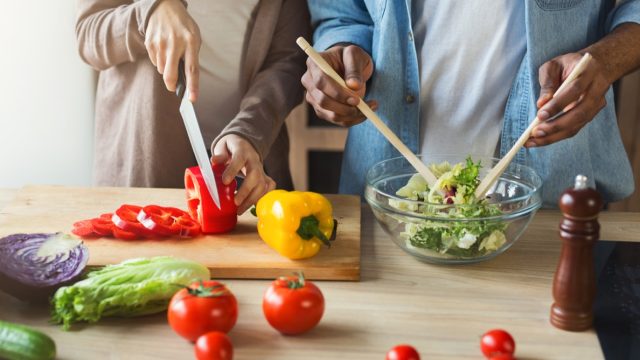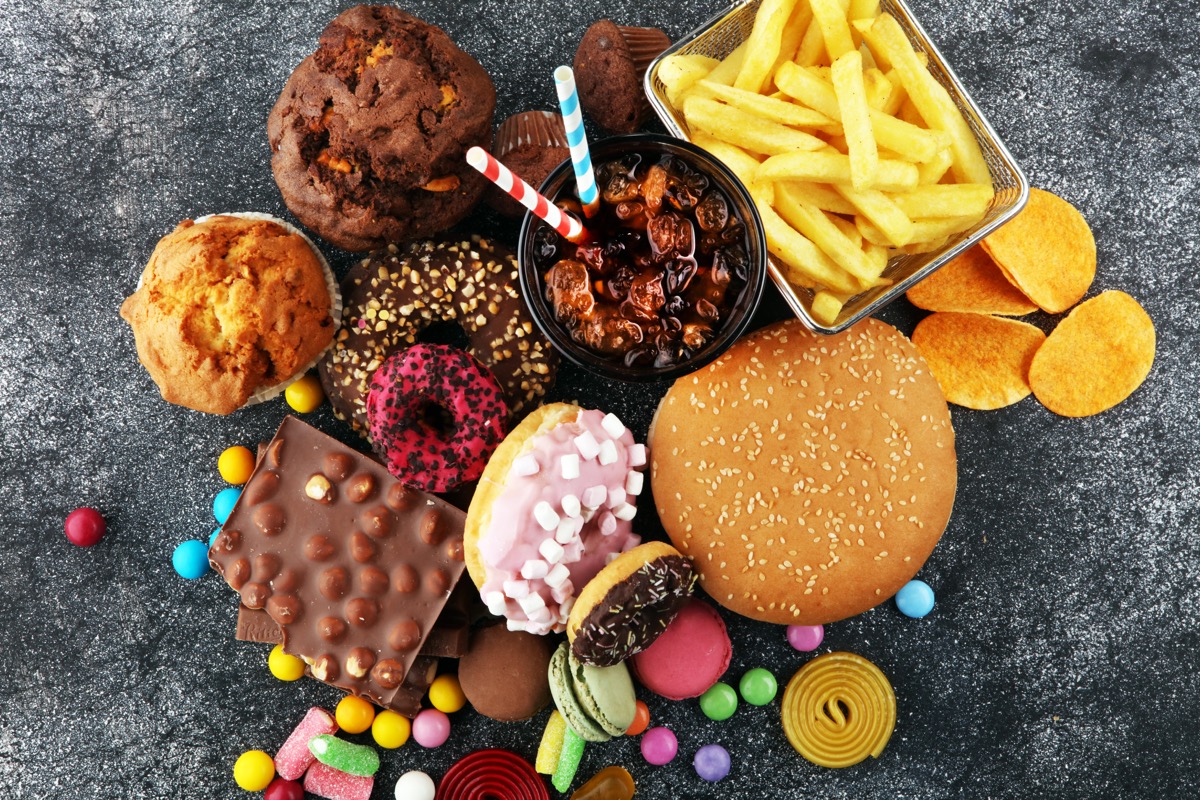I Lost 25 Pounds. Here’s How It Affected My Marriage.

Like most bad habits, my unhealthy eating started gradually: some absent-minded snacking here, an extra drink there. Soon enough, a monthly cookie binge became a weekly one.
My weight gain didn’t happen all at once, but it got worse with every passing year that I neglected to address my depression and anxiety, which was feeding it. I’d always struggled with my mental health, but it was in college that it first began to affect what and how I ate. I went through a bad breakup in the early weeks of freshman year, like a lot of recent high school grads. And, like a lot of them, I mourned the loss with a pint of ice cream and a plate of French fries while crying on a friend’s shoulder.
But even after the grieving was done, I could never seem to get my eating under control. I began to rely on comfort foods to ease my anxiety. As the stress of school ratcheted up, so did my appetite for sugar and fat. Although I was still active, exercise was no match for my emotional eating. When I was sad, I ate. When I was bored, I ate. No matter what I felt, it was an excuse to eat.
By the time I got engaged to my husband five years later, I didn’t feel physically like myself anymore. My increased weight kept me from exercising as much as I once had, both because of shame about my inability to fit into my old exercise clothes and because I was so lethargic.
I was working full-time, hunched over a computer all day, in addition to attending grad school, stressing about finances, planning the wedding, and worrying about sick and aging family members. Taking care of myself seemed like the last thing on the agenda. It felt almost frivolous to think of my own health when so many people around me were worse off.
On my wedding day, I wasn’t comfortable in my dress, and I felt self-conscious as I posed for photographs. I don’t think I’d have been ashamed if my weight gain had been natural over time, but every new pound just reminded me of the downward spiral of my mental health.

In the early days of our marriage, my husband and I never pressured each other to exercise or eat more nutritiously. We both had a tendency to overeat when we were overworked or stressed, and neither of us wanted to be the one to point out how unhealthy that was. Each of us was reluctant to be the one to say we should make a change and shift our relationship with food.
But soon thereafter, I remember feeling like my body wasn’t my own. I felt divorced and distant from it, like it was someone else’s. While I still took regular walks, a dedicated nutrition and exercise program seemed like a foreign concept. I had a vague idea that I wanted the status quo to change, but I didn’t yet feel empowered to change it myself.
Then, my body was thrown into a host of new experiences when I became pregnant around a year after our wedding. Pregnancy was scary; both our baby and I had a number of health complications. But all those trips to the doctor and ultrasound visits reminded me that my body needed tending to—and who could do it but me?
I realized that I had to make a change. We had to make a change. And we had to do it while our daughter was young, or it would be even harder to break our entrenched habits. I knew that I didn’t want to have the same heart problems that others in my family had, and I wanted to find myself again, somewhere inside. I wanted to feel like my body was my own.
After our daughter was born, my husband and I had a come-to-Jesus moment together. We knew that we had to take control of our physical and mental health. We resolved that we’d do it together, starting small by drinking more water and getting in a few hours of vigorous exercise per week. Slowly, we began to focus on adding more fresh fruits and vegetables into our diet, reducing portion sizes, avoiding sugar and fried foods, and exercising daily. As the pounds fell off, the health benefits were clear: My resting heart rate eventually dropped by a whopping 20 beats per minute, and my cholesterol returned to healthy levels.

But as our relationships with food and exercise changed, my husband and I began to discover new sides of each other, too. We learned to enjoy cooking together, finding healthy recipes after a morning at the farmer’s market and talking through them every night in the kitchen instead of relying on the same-old go-to dinners. When we started to fall into old habits, we’d talk through the stressors and pain that caused them rather than numbing ourselves with food or television, drawing us towards a deeper understanding of one another.
As we embarked on this overhaul together, it felt like our health was a shared family project rather than some kind of punishment or begrudging obligation—which is always how I’d thought of “diets” before.
Our sex drives had been affected somewhat by all the stress, too. Our new, shared approach to life made us feel more romantic and less exhausted at the end of the day. And because we were so much more active than before, we began to explore new activities for date nights rather than the usual dinners out or delivery-and-Netflix binges. Suddenly, it felt like there was more to explore and discover, more to savor and enjoy.
Now down a total of 50 pounds—and 25 for my husband, too—I feel lighter mentally and physically, knowing that I am finally in control of my body, rather than being controlled by my moods and whims. Mine and my husband’s commitment to our health revealed our deeper commitment to a long life together—as a team. And for a deep dive into the science of slimming down, check out these 20 Science-Backed Ways to Motivate Yourself to Lose Weight.
To discover more amazing secrets about living your best life, click here to follow us on Instagram!